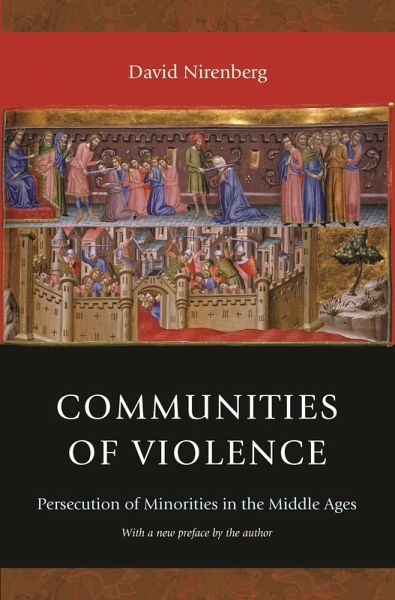
Communities of Violence (eBook, ePUB)
Persecution of Minorities in the Middle Ages - Updated Edition
Versandkostenfrei!
Sofort per Download lieferbar
17,95 €
inkl. MwSt.
Weitere Ausgaben:

PAYBACK Punkte
9 °P sammeln!
In the wake of modern genocide, we tend to think of violence against minorities as a sign of intolerance, or, even worse, a prelude to extermination. Violence in the Middle Ages, however, functioned differently, according to David Nirenberg. In this provocative book, he focuses on specific attacks against minorities in fourteenth-century France and the Crown of Aragon (Aragon, Catalonia, and Valencia). He argues that these attacks--ranging from massacres to verbal assaults against Jews, Muslims, lepers, and prostitutes--were often perpetrated not by irrational masses laboring under inherited i...
In the wake of modern genocide, we tend to think of violence against minorities as a sign of intolerance, or, even worse, a prelude to extermination. Violence in the Middle Ages, however, functioned differently, according to David Nirenberg. In this provocative book, he focuses on specific attacks against minorities in fourteenth-century France and the Crown of Aragon (Aragon, Catalonia, and Valencia). He argues that these attacks--ranging from massacres to verbal assaults against Jews, Muslims, lepers, and prostitutes--were often perpetrated not by irrational masses laboring under inherited ideologies and prejudices, but by groups that manipulated and reshaped the available discourses on minorities. Nirenberg shows that their use of violence expressed complex beliefs about topics as diverse as divine history, kinship, sex, money, and disease, and that their actions were frequently contested by competing groups within their own society.
Nirenberg's readings of archival and literary sources demonstrates how violence set the terms and limits of coexistence for medieval minorities. The particular and contingent nature of this coexistence is underscored by the book's juxtapositions--some systematic (for example, that of the Crown of Aragon with France, Jew with Muslim, medieval with modern), and some suggestive (such as African ritual rebellion with Catalan riots). Throughout, the book questions the applicability of dichotomies like tolerance versus intolerance to the Middle Ages, and suggests the limitations of those analyses that look for the origins of modern European persecutory violence in the medieval past.
Nirenberg's readings of archival and literary sources demonstrates how violence set the terms and limits of coexistence for medieval minorities. The particular and contingent nature of this coexistence is underscored by the book's juxtapositions--some systematic (for example, that of the Crown of Aragon with France, Jew with Muslim, medieval with modern), and some suggestive (such as African ritual rebellion with Catalan riots). Throughout, the book questions the applicability of dichotomies like tolerance versus intolerance to the Middle Ages, and suggests the limitations of those analyses that look for the origins of modern European persecutory violence in the medieval past.













